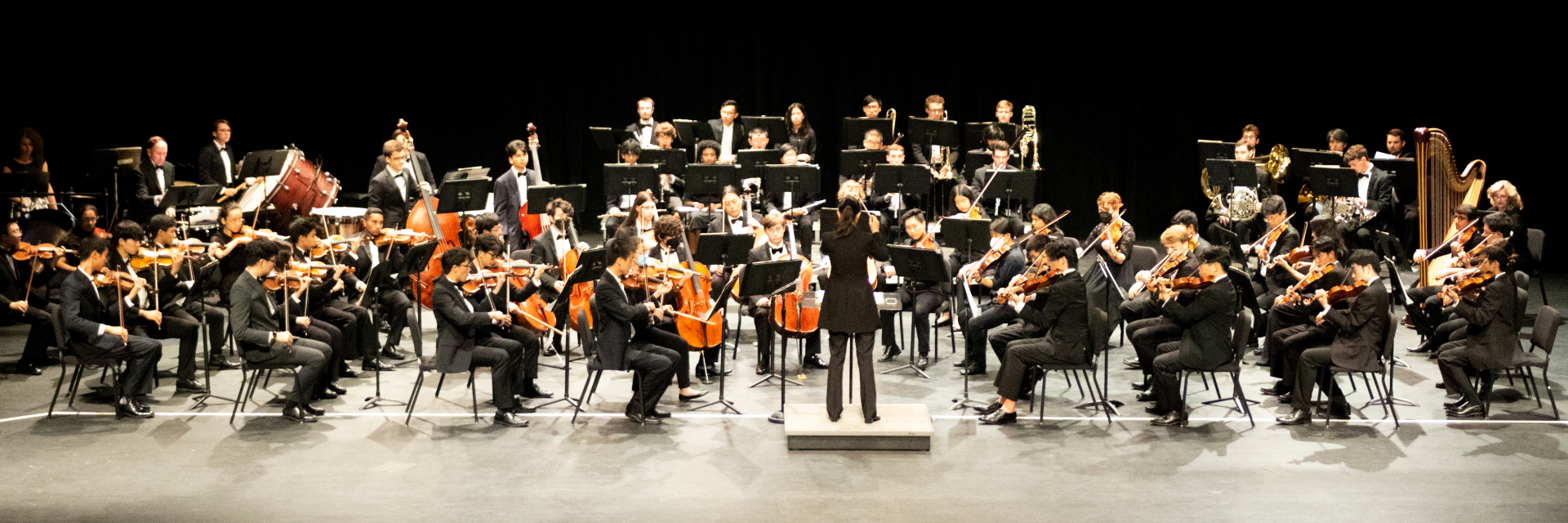Stay up to date with the School of Music!

Georgia Tech School of Music Presents:
Music and Literature
Georgia Tech School of Music Presents:
Music and Literature
Thursday, September 21st 2023
7:30pm
Ferst Center for the Arts
Dr. Chaowen Ting, Conductor
The GT Symphony Orchestra opens the 2023-24 season with a program full of music inspired by literature. In addition to three Shakespeare-related works by Dvorak, Shostakovich, and Anna Clyne, the orchestra will be giving the US premiere of the Taiwan Balladry Series by composer Chihchun Lee.
Program
[US Premiere]
- I. Introduction
- II. Ball at the Palace
- VI. Arrival and Scene of the Players
- VIII. The Duel and Death of Hamlet
arr. Levon Atovmyan (1901-1973)
Program Notes – Taiwan Balladry Series
The Hok-lo Balladry Tiu-tiu Tâng-á is inspired by a traditional Taiwanese Hok-lo folksong【丟丟銅仔】 Tiu-tiu Tâng-á (“Drip, Drip, Drop”), as well as 草蜢弄雞公 Chháu-meh Lāng Ke-kang (“Coquette teases Rooster”) and 天黑黑 Thin O͘-o͘ (“Cloudy Day”). The emphasis of this movement is meter changes and alternative rhythmic groupings. The speaking voices are to imitate sounds of the choo-choo train, such as steam leaving the cylinders, which were mounted down by the wheels and the horns from the trains, as reference to 【丟丟銅仔】 Tiu-tiu Tâng-á.
Program Notes – Sound and Fury
Sound and Fury draws upon two great works of art for its inspiration: Haydn’s Symphony No. 60 (“Il Distratto”) and Shakespeare’s Macbeth. The piece was premiered by the Scottish Chamber Orchestra on a program that included this Haydn symphony.
“ll Distratto” incorporates Haydn’s music for Le Distrait, a play by Jean-François Regnard, so it seemed fitting to draw inspiration from both musical and literary sources for Sound and Fury. To begin, I listened to “lI Distratto” many times and on a single sheet of paper, I wrote down the key elements that caught my ear, which ranged from rhythmic gestures to melodic ideas, harmonic progressions, and even a musical joke (Haydn brings the feverish final prestissimo to a grinding halt for the violins to re-tune). I chose between one and four elements from each of the six movements and developed them though my own lens - layering, stretching, fragmenting and looping. Whilst experienced as one complete movement, Sound and Fury is also structured in six sub-sections that follow the same trajectory of “ll Distratto.”
In the fifth section of Sound and Fury I looped a harmonic progression from Haydn’s Adagio in “ll Distratto,” and this provides a bed of sound to support the delivery of “Tomorrow, and tomorrow, and tomorrow…,” the last soliloquy delivered by Macbeth upon learning of his wife’s death, and from which this work takes its title.
Tomorrow, and tomorrow, and tomorrow,
Creeps in this petty pace from day to day,
To the last syllable of recorded time;
And all our yesterdays have lighted fools
The way to dusty death. Out, out, brief candle!
Life's but a walking shadow, a poor player,
That struts and frets his hour upon the stage,
And then is heard no more. It is a tale
Told by an idiot, full of sound and fury,
Signifying nothing.
The connection to Shakespeare’s play emerged gradually during the writing process, but especially after watching a recording of a 1979 masterclass with Sir Ian McKellen analyzing this soliloquy’s imagery and rhythmic use of language. Time lies at the heart of it - “hereafter … time … tomorrow … to day … yesterday …” and music provides us with this framework. The last line of this soliloquy (“Signifying nothing.”) is incomplete; McKellen explains “the beats of the rest of that pentameter are not there - because the end of the speech is total silence - total oblivion - total emptiness.” So rich in imagery and metaphor, I also found inspiration in Shakespeare’s rhythmic use of language. For example, before delivering this soliloquy, and after learning of his wife’s death Macbeth says, “She should have died hereafter; There would have been a time for such a word.” McKellen says: “There’s something about that line which trips - in Hamlet’s words - tick tocks like a clock.” This is something that I play with also - layering rhythmic fragments that repeat and mark the passage of time.
My intention with Sound and Fury is to take the listener on a journey that is both invigorating - with ferocious string gestures that are flung around the orchestra with skittish outbursts - and serene and reflective - with haunting melodies that emerge and recede. Thank you to the Scottish Chamber Orchestra, The Orchestre National de Lyon and Hong Kong Sinfonietta for this opportunity to delve into “ll Distratto” for the first time, and to revisit Macbeth.

Composer Bio – Chihchun Lee
Taiwanese-American composer Chihchun Chi-sun Lee’s works were described as “eye-openingly, befittingly, complex, but rather arresting to hear” by Boston Globe, “exploring a variety of offbeat textures and unusual techniques” by Gramophone and “eastern techniques blended with sophisticated modern writing style” by “Amadeus” Il mensile della grande musica. The winner of the 1st Biennial Brandenburg Symphony International Composition Competition in Germany and 2015 Guggenheim Fellow, she is originally from Kaohsiung, Taiwan. She has received numerous honors; these include commissions from the Boston Symphony Orchestra (the 1st Taiwanese and the 4th Asian composer), Fromm Music Foundation at Harvard University (2018 & 2001), Barlow Endowment, the Taiwan National Culture and Arts Foundation, Taiwan National Symphony Orchestra (NSO), National Taiwan Symphony Orchestra (NTSO), National Orchestra of Korea (NOK) and Taiwan National Chinese Orchestra, Theodore Front Prize from International Alliance for Women in Music, ISCM/ League of Composers Competition, International Festival of Women Composers Composition Prize, Florida Individual Artist Fellowship, Gugak Fellowship, and the Golden Melody Awards nomination for “best composer” (2019 & 2009) and "Best Crossover Music Album Award" (2022). She was the 1st Taiwanese/Asian composer to serve as a composer-in-residence at NeoArte Syntezator Sztuki, Poland in 2022 with a portrait concert. In 2017, Lee is honored with Alumni Achievement Award in Music in Recognition of Outstanding Contribution to Music at Ohio University’s 100th anniversary of music department.

Composer Bio – Anna Clyne
Described as a “composer of uncommon gifts and unusual methods” in a New York Times profile and as “fearless” by NPR, GRAMMY-nominated Anna Clyne is one of the most in-demand composers today, working with orchestras, choreographers, filmmakers, and visual artists around the world.
Clyne has been commissioned and presented by the world’s most dynamic and revered arts institutions, including the Barbican, Carnegie Hall, Kennedy Center, Los Angeles Philharmonic, MoMA, Philharmonie de Paris, Royal Concertgebouw Orchestra, San Francisco Ballet, and the Sydney Opera House; and her music has opened such events as the Edinburgh International Festival, The Last Night of the Proms, and the New York Philharmonic’s 2021–2022 season.
Clyne often collaborates on creative projects across the music industry, including Between the Rooms, a film with choreographer Kim Brandstrup and LA Opera, and the Nico Project at the Manchester International Festival, a stage work about pop icon Nico’s life that featured Clyne’s reimagining of The Marble Index for orchestra and voices. Other recent collaborators include such notable musicians as Jess Gillam, Martin Fröst, Pekka Kuusisto, and Yo-Yo Ma.
In 2022–2023, Clyne serves as Composer-in-Residence with the Philharmonia Orchestra and the Trondheim Symphony Orchestra, as well as the Helsinki Philharmonic Orchestra starting in the 2023–2024 season. Past residencies include the Baltimore Symphony Orchestra, Chicago Symphony Orchestra, L’Orchestre national d’Île-de-France, and the Scottish Chamber Orchestra.
Ensemble Members
|
Violin I |
Major |
|
Adrian Cheung, Concertmaster |
Computer Science |
|
Amartya Kallingal, Assistant Concertmaster |
Computer Science |
|
Suann Kim |
Chemical and Biomolecular Engineering |
|
Matthew Rohan |
Chemistry |
|
Ryder Johnson |
Computer Engineering |
|
Banglue Wei |
Aerospace Engineering |
|
Harold Graney Green |
Computer Science |
|
Jaiden Lulla |
Aerospace Engineering |
|
Marissa Mandir |
Electrical Engineering |
|
Chengrui Li |
Computational Science and Engineering |
|
Raymond Jia |
Computer Engineering |
|
Anu Raghavan |
Chemical and Biomolecular Engineering |
|
Violin II |
|
|
Claire Kim, Principal |
Biomedical Engineering |
|
Sila Keha |
Industrial Engineering |
|
Madison Park |
Mechanical Engineering |
|
Lawrence Ro |
Electrical Engineering |
|
Daeyong Kwon |
Computer Science |
|
Xiaomeng Ye |
Computer Science |
|
Subrahmanyam Mullangi |
Computer Science |
|
Rick Nguyen |
Computational Media |
|
Jonathan Shi |
Computer Science |
|
Sohum Gala |
Computer Science |
|
Nathan Lin |
Computer Science |
|
Viola |
|
|
Olivia Johnson-Liu, Principal |
Business Administration |
|
Emma Axelson |
Transportation Systems |
|
May Tang |
Computer Science |
|
Julian Aldana Brol |
Civil Engineering |
|
Ivy Xue |
Neuroscience |
|
Ayush Narain |
Computer Science |
|
Cello |
|
|
Nat Wertz, Principal |
Computer Science |
|
Will Deinzer |
Computer Science |
|
Layla Libanan |
Biomedical Engineering |
|
Ryan Stover |
Aerospace Engineering |
|
Benjamin Borthwick |
Computer Science |
|
Matthew Zhou |
Computer Science |
|
Sean Yoshihara |
Computer Science |
|
Nathan Shepherd |
Computer Engineering |
|
Bass |
|
|
Atharva Gujrathi, Principal |
Aerospace Engineering |
|
Audrey Nguyen |
Biology |
|
Flute |
Major |
|
Yoojin Jeong ~ |
Neuroscience |
|
Annabelle Lee ^ |
Computer Science |
|
Alex Yang * |
Economics |
|
Oboe |
|
|
Renzo Jansema ^~ |
Industrial Design |
|
Oliver Long * |
Chemical and Biomolecular Engineering |
|
Raymond Yang |
Biomedical Engineering |
|
Clarinet |
|
|
Nathan Duggal * |
Computer Science |
|
Ryan Murphey ^~ |
Mechanical Engineering |
|
Bassoon |
|
|
Hannah Tourial * |
Industrial and Systems Engineering |
|
Lixin Zheng ^~ |
Mathematics |
|
Horn |
|
|
Alex Bendeck ~ |
Computer Science |
|
Cathleen Bolger |
Aerospace Engineering |
|
Akhil Gopal ^* |
Mathematics |
|
Nicholas Reed |
Computer Science |
|
Carlos Sanchez |
Biomedical Engineering |
|
Trumpet |
|
|
Camryn Aguilar ~ |
Chemical and Biomolecular Engineering |
|
Mason Beyke |
Psychology |
|
Jonah Wu ^* |
Industrial Engineering |
|
Trombone |
|
|
Joshua Antony |
Industrial Engineering |
|
Pranjal Chatterjee ^* |
Electrical Engineering |
|
Sanjay Rangarajan |
Chemistry |
|
Tuba |
|
|
Alejandro Martinez |
Physics |
|
Harp |
|
|
Anoushka Scaria |
Computer Science |
|
Timpani/Percussion |
|
|
Ulyana Buslovska |
Mathematics |
|
Sam Woolsey |
Mechanical Engineering |
Denotes principal player: ^Dvorak, ~Clyne, *Shostakovich
Georgia Tech School of Music
Through interdisciplinary degree programs, outstanding performance ensembles, and innovative research endeavors, the Georgia Tech School of Music cultivates a rich legacy of musical traditions and develops cutting-edge technologies to help define music's future. The School serves students in bachelors, masters, and doctoral programs in music technology and offers innovative performance opportunities, courses, and cultural and artistic experiences for students throughout the Institute.